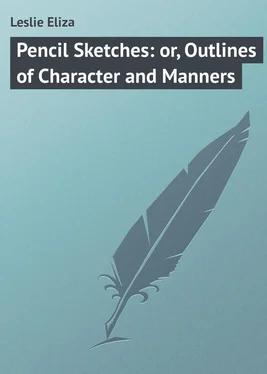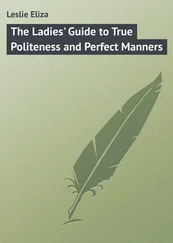Eliza Leslie - Pencil Sketches - or, Outlines of Character and Manners
Здесь есть возможность читать онлайн «Eliza Leslie - Pencil Sketches - or, Outlines of Character and Manners» — ознакомительный отрывок электронной книги совершенно бесплатно, а после прочтения отрывка купить полную версию. В некоторых случаях можно слушать аудио, скачать через торрент в формате fb2 и присутствует краткое содержание. Жанр: foreign_prose, foreign_humor, на английском языке. Описание произведения, (предисловие) а так же отзывы посетителей доступны на портале библиотеки ЛибКат.
- Название:Pencil Sketches: or, Outlines of Character and Manners
- Автор:
- Жанр:
- Год:неизвестен
- ISBN:нет данных
- Рейтинг книги:3 / 5. Голосов: 1
-
Избранное:Добавить в избранное
- Отзывы:
-
Ваша оценка:
- 60
- 1
- 2
- 3
- 4
- 5
Pencil Sketches: or, Outlines of Character and Manners: краткое содержание, описание и аннотация
Предлагаем к чтению аннотацию, описание, краткое содержание или предисловие (зависит от того, что написал сам автор книги «Pencil Sketches: or, Outlines of Character and Manners»). Если вы не нашли необходимую информацию о книге — напишите в комментариях, мы постараемся отыскать её.
Pencil Sketches: or, Outlines of Character and Manners — читать онлайн ознакомительный отрывок
Ниже представлен текст книги, разбитый по страницам. Система сохранения места последней прочитанной страницы, позволяет с удобством читать онлайн бесплатно книгу «Pencil Sketches: or, Outlines of Character and Manners», без необходимости каждый раз заново искать на чём Вы остановились. Поставьте закладку, и сможете в любой момент перейти на страницу, на которой закончили чтение.
Интервал:
Закладка:
Mrs. Marsden, much discomfited, led Aunt Quimby to a chair between two matrons who were among "the unavoidably invited," and whose pretensions to refinement were not very palpable. But the old lady had no idea of remaining stationary all the evening between Mrs. Johnson and Mrs. Jackson. She wisely thought "she could see more of the party," if she frequently changed her place, and being of what is called a sociable disposition, she never hesitated to talk to any one that was near her, however high or however low.
"Dear mother," said Albina in an under-voice, "what can be the reason that every one, in tasting the ice-cream, immediately sets it aside as if it was not fit to eat? I am sure there is everything in it that ought to be."
"And something more than ought to be," replied Mrs. Marsden, after trying a spoonful – "the salt that was laid round the freezer has got into the cream (I suppose by Dixon's carelessness), and it is not fit to eat."
"And now," said Albina, starting, "I will show you a far worse mortification than the failure of the ice-cream. Only look – there sits Aunt Quimby between Mr. Montague and Mrs. Washington Potts."
"How in the world did she get there?" exclaimed Mrs. Marsden. "I dare say she walked up, and asked them to make room for her between them. There is nothing now to be done but to pass her off as well as we can, and to make the best of her. I will manage to get as near as possible, that I may hear what she is talking about, and take an opportunity of persuading her away."
As Mrs. Marsden approached within hearing distance, Mr. Montague was leaning across Aunt Quimby, and giving Mrs. Potts an account of something that had been said or done during a splendid entertainment at Devonshire House. – "Just at that moment," said he, "I was lounging into the room with Lady Augusta Fitzhenry on my arm (unquestionably the finest woman in England), and Mrs. Montague was a few steps in advance, leaning on my friend the Marquis of Elvington."
"Pray, sir," said Mrs. Quimby, "as you are from England, do you know anything of Betsey Dempsey's husband?"
"I have not the honour of being acquainted with that person," replied Mr. Montague, after a withering stare.
"Well, that's strange," pursued Aunt Quimby, "considering that he has been living in London at least eighteen years – or perhaps it is only seventeen. And yet I think it must be near eighteen, if not quite. Maybe seventeen and a half. Well it's best to be on the safe side, so I'll say seventeen. Betsey Dempsey's mother was an old school-mate of mine. Her father kept the Black Horse tavern. She was the only acquaintance I ever had that married an Englishman. He was a grocer, and in very good business; but he never liked America, and was always finding fault with it, and so he went home, and was to send for Betsey. But he never sent for her at all; and for a very good reason; which was that he had another wife in England, as most of them have – no disparagement to you, sir."
Mrs. Marsden now came up, and informed Mrs. Potts in a whisper, that the good old lady beside her, was a distant relation or rather connexion of Mr. Marsden's, and that, though a little primitive in appearance and manner, she had considerable property in bank-stock. To Mrs. Marsden's proposal that she should exchange her seat for a very pleasant one in the other room next to her old friend, Mrs. Willis, Aunt Quimby replied nothing but "Thank you, I'm doing very well here."
Mrs. and Miss Montague, apparently heeding no one else, had talked nearly the whole evening to each other, but loudly enough to be heard by all around them. The young lady, though dressed as a child, talked like a woman, and she and her mother were now engaged in an argument whether the flirtation of the Duke of Risingham with Lady Georgiana Melbury would end seriously or not.
"To my certain knowledge," said Miss Montague, "his Grace has never yet declared himself to Lady Georgiana, or to any one else."
"I'll lay you two to one," said Mrs. Montague, "that he is married to her before we return to England."
"No," replied the daughter, "like all others of his sex he delights in keeping the ladies in suspense."
"What you say, miss, is very true," said Aunt Quimby, leaning in her turn across Mr. Montague, "and, considering how young you are, you talk very sensibly. Men certainly have a way of keeping women in suspense, and an unwillingness to answer questions, even when we ask them. There's my son-in-law, Billy Fairfowl, that I live with. He married my daughter Mary, eleven years ago the 23d of last April. He's as good a man as ever breathed, and an excellent provider too. He always goes to market himself; and sometimes I can't help blaming him a little for his extravagance. But his greatest fault is his being so unsatisfactory. As far back as last March, as I was sitting at my knitting in the little front parlour with the door open (for it was quite warm weather for the time of the year), Billy Fairfowl came home, carrying in his hand a good sized shad; and I called out to him to ask what he gave for it, for it was the very beginning of the shad season; but he made not a word of answer; he just passed on, and left the shad in the kitchen, and then went to his store. At dinner we had the fish, and a very nice one it was; and I asked him again how much he gave for it, but he still avoided answering, and began to talk of something else; so I thought I'd let it rest awhile. A week or two after, I again asked him; so then he actually said he had forgotten all about it. And to this day I don't know the price of that shad."
The Montagues looked at each other – almost laughed aloud, and drew back their chairs as far from Aunt Quimby as possible. So also did Mrs. Potts. Mrs. Marsden came up in an agony of vexation, and reminded her aunt in a low voice of the risk of renewing her rheumatism by staying so long between the damp, newly-papered walls. The old lady answered aloud – "Oh! you need not fear, I am well wrapped up on purpose. And indeed, considering that the parlours were only papered to-day, I think the walls have dried wonderfully (putting her hand on the paper) – I am sure nobody could find out the damp if they were not told."
"What!" exclaimed the Montagues; "only papered to-day – (starting up and testifying all that prudent fear of taking cold, so characteristic of the English). How barbarous to inveigle us into such a place!"
"I thought I felt strangely chilly all the evening," said Mrs. Potts, whose fan had scarcely been at rest five minutes.
The Montagues proposed going away immediately, and Mrs. Potts declared she was most apprehensive for poor little La Fayette. Mrs. Marsden, who could not endure the idea of their departing till all the refreshments had been handed round (the best being yet to come), took great pains to persuade them that there was no real cause of alarm, as she had had large fires all the afternoon. They held a whispered consultation, in which they agreed to stay for the oysters and chicken salad, and Mrs. Marsden went out to send them their shawls, with one for La Fayette.
By this time the secret of the newly-papered walls had spread round both rooms; the conversation now turned entirely on colds and rheumatisms; there was much shivering and considerable coughing, and the demand for shawls increased. However, nobody actually went home in consequence.
"Papa," said Miss Montague, "let us all take French leave as soon as the oysters and chicken salad have gone round."
Albina now came up to Aunt Quimby (gladly perceiving that the old lady looked tired), and proposed that she should return to her chamber, assuring her that the waiters should be punctually sent up to her – "I do not feel quite ready to go yet," replied Mrs. Quimby. "I am very well here. But you need not mind me . Go back to your company, and talk a little to those three poor girls in the yellow frocks that nobody has spoken to yet, except Bromley Cheston. When I am ready to go I shall take French leave, as these English people call it."
Читать дальшеИнтервал:
Закладка:
Похожие книги на «Pencil Sketches: or, Outlines of Character and Manners»
Представляем Вашему вниманию похожие книги на «Pencil Sketches: or, Outlines of Character and Manners» списком для выбора. Мы отобрали схожую по названию и смыслу литературу в надежде предоставить читателям больше вариантов отыскать новые, интересные, ещё непрочитанные произведения.
Обсуждение, отзывы о книге «Pencil Sketches: or, Outlines of Character and Manners» и просто собственные мнения читателей. Оставьте ваши комментарии, напишите, что Вы думаете о произведении, его смысле или главных героях. Укажите что конкретно понравилось, а что нет, и почему Вы так считаете.












